| By: Paul S. Cilwa | Viewed: 4/17/2024 Posted: 11/1/2011 |
Page Views: 7015 | |
| Topics: #Codependency | |||
| It's time I recognized my role in my past unsuccessful relationships. | |||
I've just ended my fourth romantic relationship and it's time to look at the role I played in why they didn't work out, as a first step in learning to stop perpetuating this pattern.
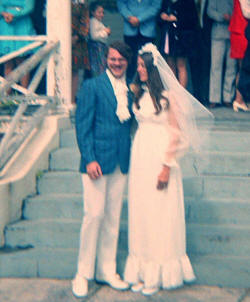
I married in 1972 when I was 20. I married the girl I had dated my senior year in high school, but we'd known each other for years as she was the girl down the street, a playmate of my sisters who participated in neighborhood games such as street dodgeball and hikes into the Florida jungle.
We broke up for two years, then picked up again when her father called and asked me to do some carpentry work in his closet. (How's that for ironic?!) A week later, we were engaged. Six months later, we were married. As anyone can see from our wedding photo, I was gayer than gay but in the ignorant '70s, no one said anything to anyone.
I had known for years that Mary's father was an alcoholic who once shot out his own tires to prevent his car from being stolen by invisible thieves, and that her mother was emotionally abusive. I also knew I was attracted to men, though thanks to my small-town upbringing, I actually believed I was the only such man in the entire world. And it never occurred to me that that fact had any bearing whatsoever on whether I should get married or not. In my world, at that time, everyone either got married, or became a priest. I had no interest in becoming a priest, and I liked Mary, and she clearly needed rescuing from her dysfunctional home. So I proposed, she accepted, and we had four wonderful children together, and I do not regret any of it. We separated after 20 years at her request, divorced two years later, and are still very close friends.
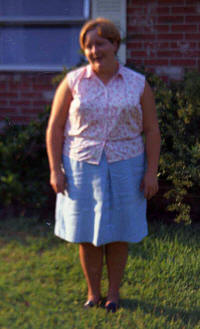 For
completeness, I should add I proposed to another girl in between
high school and reconnecting with Mary. Her name was Marianne Pye,
and I had dated her in my sophomore year of high school. After
graduating, we reconnected and became friends (though never lovers).
She hated her parents with whom she lived, and got pregnant by an
abusive boyfriend. I adored her baby, little Adam Parker Pye, and
offered to marry her, primarily to rescue her from her dysfunctional
family and to "give the baby a name" which was considered chivalrous
in those days. Wisely, she refused. (Instead, she married the baby's
father, eventually divorcing him after she hit him with a heavy iron
skillet in self-defense, and eventually died of lupus. Very sad.)
For
completeness, I should add I proposed to another girl in between
high school and reconnecting with Mary. Her name was Marianne Pye,
and I had dated her in my sophomore year of high school. After
graduating, we reconnected and became friends (though never lovers).
She hated her parents with whom she lived, and got pregnant by an
abusive boyfriend. I adored her baby, little Adam Parker Pye, and
offered to marry her, primarily to rescue her from her dysfunctional
family and to "give the baby a name" which was considered chivalrous
in those days. Wisely, she refused. (Instead, she married the baby's
father, eventually divorcing him after she hit him with a heavy iron
skillet in self-defense, and eventually died of lupus. Very sad.)
So, a year after Mary's and my divorce was final—and after an
interim in which I was actually very happy as a single man—I
met
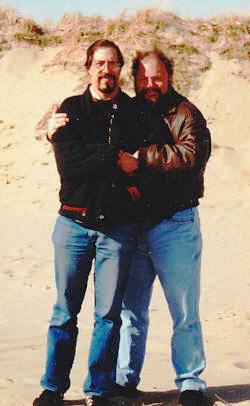 Steve,
a man who was in a dysfunctional relationship with the man with whom
he lived, who, Steve told me, had not spoken to him in six months.
Steve had been sleeping on the sofa all that time. Steve explained
that Glen was emotionally abusive, but he still loved him and would
take him back in a moment if Glen would let him. All I heard was
that Steve was in desperate need of my love, and I did everything I
could to win him over. We took a trip together to Key West; and he
was so reluctant to go back to Glen's that we extended our vacation
and added a weekend in Provincetown. Steve told me at this point
that he would move in with me.
Steve,
a man who was in a dysfunctional relationship with the man with whom
he lived, who, Steve told me, had not spoken to him in six months.
Steve had been sleeping on the sofa all that time. Steve explained
that Glen was emotionally abusive, but he still loved him and would
take him back in a moment if Glen would let him. All I heard was
that Steve was in desperate need of my love, and I did everything I
could to win him over. We took a trip together to Key West; and he
was so reluctant to go back to Glen's that we extended our vacation
and added a weekend in Provincetown. Steve told me at this point
that he would move in with me.
I was ecstatic. I made room in my closet and cleared half the drawers in my dresser. However, on the day he was to move in, he called to tell me he'd changed his mind. Glen, realizing he'd finally driven his partner away, begged him to stay and Steve did. I was devastated, and remained depressed over this loss for several years, even though Steve and I had only been dating for five-and-a-half months.
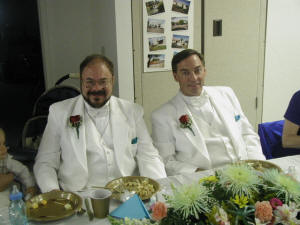 I
met Michael while teaching a computer programming class in
Manhattan. He had been living with his partner, but Michael
described their relationship as dysfunctional. His partner was still
closeted, and Michael wasn't even allowed to tell anyone they were a
couple! Michael had, in fact, announced that if things didn't
change, he'd be moving out; and they hadn't changed. So then I came
along, having found someone else I could rescue. We met a few times
in the next two months; I fell in love with him and proposed on New
Year's Day; he quit his job and moved in with me the following March
and we moved, together, to Arizona in September. We
married (in our
church) in August of 2000.
I
met Michael while teaching a computer programming class in
Manhattan. He had been living with his partner, but Michael
described their relationship as dysfunctional. His partner was still
closeted, and Michael wasn't even allowed to tell anyone they were a
couple! Michael had, in fact, announced that if things didn't
change, he'd be moving out; and they hadn't changed. So then I came
along, having found someone else I could rescue. We met a few times
in the next two months; I fell in love with him and proposed on New
Year's Day; he quit his job and moved in with me the following March
and we moved, together, to Arizona in September. We
married (in our
church) in August of 2000.
Michael embraced my family—including Mary—and they, him. However, as the years went by, I began to feel that Michael was growing distant. Even though we lived together with varying members of the family, I grew lonelier and lonelier. We no longer slept together, yet made an effort to present to the world a picture of the perfect couple. I began to make friends on my own, yet the loneliness persisted.
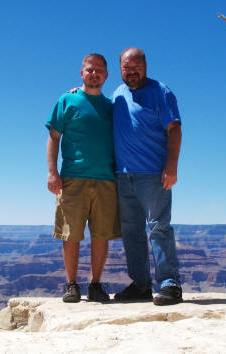 That's
how I met Jason. Neither of us expected to be anything but friends,
yet there was undeniable chemistry. He and his partner of 12 years
had also presented themselves to the world as the perfect couple,
and they certainly loved each other—but as dear friends. They were
not "in" love. Clearly it was a dysfunctional relationship, as was
mine. And when, as we fell in love, Jason's partner made life
difficult for him at home, I told Michael we were done as a
couple—indeed, had been for years—and that I was moving Jason in
to join us. Originally, we had planned to do this after New Year's.
But I perceived Jason's discomfort at home as being so desperate
that, to rescue him, I all but insisted he move in with us in
December, which made things very uncomfortable for everyone else in
the household. After all, none of them, including Michael, had been
aware I was so unhappy; they were all blindsided.
That's
how I met Jason. Neither of us expected to be anything but friends,
yet there was undeniable chemistry. He and his partner of 12 years
had also presented themselves to the world as the perfect couple,
and they certainly loved each other—but as dear friends. They were
not "in" love. Clearly it was a dysfunctional relationship, as was
mine. And when, as we fell in love, Jason's partner made life
difficult for him at home, I told Michael we were done as a
couple—indeed, had been for years—and that I was moving Jason in
to join us. Originally, we had planned to do this after New Year's.
But I perceived Jason's discomfort at home as being so desperate
that, to rescue him, I all but insisted he move in with us in
December, which made things very uncomfortable for everyone else in
the household. After all, none of them, including Michael, had been
aware I was so unhappy; they were all blindsided.
I was, and remain, in love with Jason. However, his OCD finally forced me, after months of trying to "fix" him, to move out. The repercussions of that are still playing out, as I try to find a place to live and we deal with clearing our respective things out of the apartment we shared.
So, what do I find all my relationships have in common? In every one, I was trying to "rescue" someone I perceived as needing my help. None of them asked for my help, but I provided it nevertheless and stuck with each until they either left me, or my unbearable unhappiness and resentment forced me to leave.
There's a name for this pattern. It's called codependency.
The term, codependency, was originally coined to describe the members of a family of an alcoholic or other addict. As people adjust to their loved one's sometimes brutal and always erratic behavior, they learn behaviors that will minimize bad reactions from the addict. Since addicts are dependent on some substance, the family members were said to be co-dependent.
It is said that no one with an addictive parent can avoid becoming codependent: either a "codependent rescuer" who tries, continually and unsuccessfully, to rescue the addict, or a "codependent victim" who bemoans his or her lot but doesn't ever manage to improve it.
But the problem then becomes one in its own right, as codependents grow up and create families—and new codependents—of their own. Rescuers tend to create victims to rescue; victims tend to look for rescuers.
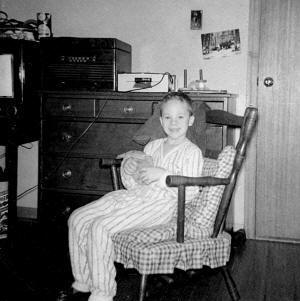 New
information suggests that codependency starts early in life, due to
some trauma the child suffers. In the traditional example, the child
observes (or worse, is harmed in) a fight between his or her
parents. However, my mom, looking back, had all the hallmarks of
being a codependent victim. And when my dad died when I was 7, I was
told that now I would be the "head of the family". As a
serious child anyway, I took that seriously and devoted myself for
the rest of her life to caring for her needs, in precedence to my
own.
New
information suggests that codependency starts early in life, due to
some trauma the child suffers. In the traditional example, the child
observes (or worse, is harmed in) a fight between his or her
parents. However, my mom, looking back, had all the hallmarks of
being a codependent victim. And when my dad died when I was 7, I was
told that now I would be the "head of the family". As a
serious child anyway, I took that seriously and devoted myself for
the rest of her life to caring for her needs, in precedence to my
own.
See, it's not codependent to care for someone or to do something for them. What makes it codependent is when the person resents having to do it, but does it anyway. And this applies to both rescuers and victims. The rescuer, trying to avert certain disaster, tells the victim what to do. The victim resents being told what to do and does the opposite, which usually does end in disaster, which the rescuer must then clean up—resentfully. The rescuer ends up feeling validated, that the victim cannot manage his or her life and needs rescuing; the victim ends up validated that everything does go wrong for him. And thus the game continues, with both players feeling used and abused by the other, but seeing no way out.
There are a number of classic signs of codependency, not all of which will fit any one person, of course. Broadly, they fit into patterns of denial, low self-esteem, avoidance, compliance, and control. Here are a few examples that fit me:
- Denial: "I perceive myself as completely unselfish and dedicated to the well-being of others."
- Low self-esteem: "I have difficulty admitting that I made a mistake."
- Avoidance: "I use indirect and evasive communication to avoid conflict or confrontation."
- Compliance: "I am extremely loyal, remaining in harmful situations too long."
- Control: "I have to be 'needed' in order to have a relationship with others."
There is a way out, of course. Behavioral modification is a therapeutic technique, in which the patient is taught to recognize his or her codependent patterns, and to replace them with healthy responses. There's also Co-Dependents Anonymous, a 12-step program. And of course there are innumerable self-help books.
I read Breaking Free Of The Co-Dependency Trap when I was still married to Mary. It warned that if I learned to resist my codependent behaviors, almost certainly my spouse would leave because I no longer met her matching codependent needs. And sure, enough, about a year later, she did.
Too bad I then forgot what the book said, and fell back into the same rescuer pattern.
So, having terminated my fourth relationship, I must choose from two options. One, I stay as I am and continue to attract people to me who are equally unhappy with themselves, or I learn to conquer this condition once and for all.
Here is a non-codependent statement: "I cannot make anyone else happy. And no one else can make me happy. I can only have a healthy relationship when I am happy with myself already."
In other words, I have to learn to be okay without anyone, in order to be okay with someone.





